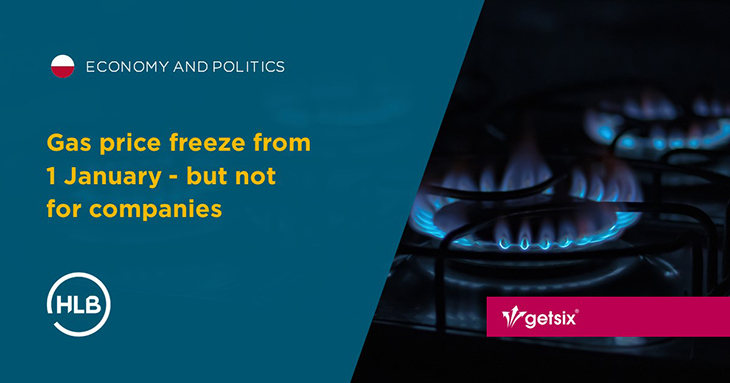Gas price freeze from 1 January – but not for companies
The Polish parliament has decided to freeze gas prices at the current level for the coming year. Gas is expected to cost a maximum of 200 PLN (~45 EUR) per MWh in 2023.
The legal umbrella covers gas prices for private households, housing cooperatives and their local heat generators, social institutions, hospitals, educational institutions, and churches. The economy, on the other hand, is left out. The statutory price regulation does not apply to businesses, nor does the law provide other price compensation measures for companies. Corresponding proposals from the opposition were rejected in the parliamentary vote. State aid for companies on gas prices “would be going too far”. – said Deputy Finance Minister Artur Soboń in response to opposition criticism. The exclusion of companies from gas price regulations or compensation measures has met with widespread criticism from business and employers’ organisations. They point out the contradictory nature of the government’s actions. In the law passed to introduce a limit on electricity prices, small and medium-sized companies were also taken into account, but not in the case of gas prices. For the chief economist of the Employers’ Association RP, Sobolewski, the gas price regulation is “further proof that for the government the highest priority is not the companies, but the voters’ potential.” The Association of Bakers criticises the government for not having listened to its warnings, which had been signalled for months. “Many bakeries will not survive this.” The Association of Food Producers also predicts an increased risk of company bankruptcies in the coming year, even among larger companies. Its director general, Andrzej Gartner, also points out an additional cost burden for companies from 1 January due to the significant increase in minimum wages.
Increase of VAT rate on gas
The government has also decided to increase the VAT rate on gas again, which was reduced to zero in February as an anti-inflation measure. From 1 January, the standard tax rate of 23% will return. In public presentation, the government has blamed the action on the fact that it was forced to do so by the dictates of EU tax regulations. However, this is a false statement. The EU directive on VAT stipulates the application of the minimum VAT rate of 5 per cent for natural gas. The application of a higher VAT rate is entirely at the discretion of the government concerned and is not enforced by Brussels. Instead of immediately introducing the full VAT rate of 23 per cent to fill the tax coffers, the government could have set VAT at 5 or 8 per cent under EU tax rules – business associations criticize.
Source: Wirtschafts-Markt Polen (17-2022 Issue 321)
If you have any questions regarding this topic or if you are in need for any additional information – please do not hesitate to contact us:
CUSTOMER RELATIONSHIPS DEPARTMENT

ELŻBIETA NARON
Head of Customer Relationships
Department / Senior Manager
getsix® Group
***





